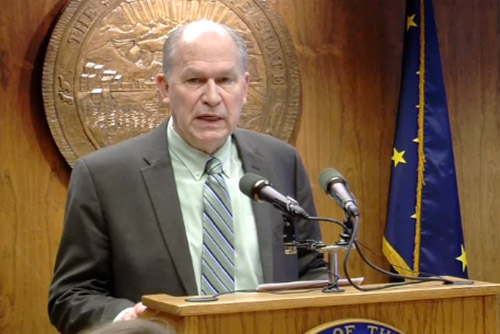
Governor will drop his Point Thomson public interest lawsuit
February 12, 2015
Members of the House Resources committee had asked that someone from Walker's Administration testify on the Point Thomson lawsuit that Walker brought several years ago as a public interest litigant. Rather than send someone from his administration, Governor Walker spoke directly to the committee to "set the record straight".
Governor Walker, Wednesday, during a press availability on Point Thomson Decision.
Walker said in his testimony to the committee, "The field contains trillions of cubic feet of natural gas reserves, and hundreds of millions of barrels of oil and condensate. It’s a resource that is worth billions of dollars to the state and means thousands of jobs to Alaskans." That wealth has been kept from the market and from Alaskans for decades, said Walker. Walker presented some numbers and a history of how that happened. He said the Point Thomson unit is 93-thousand acres of land which contains 38 leases. Richfield Oil, Humble Oil and BP acquired the very first oil and gas leases in Point Thomson in 1965. Twelve years later, Exxon discovered very substantial oil and gas in the main Point Thomson reservoir. In 1977, the state approved ExxonMobil as the unit operator. For 22 years, Exxon presented 22 individual plans of development –one each year—for the Point Thomson unit. Yet, no development occurred testified Walker. "So in 2005, as the state was evaluating yet another Plan of Development - the 23rd POD - I brought a lawsuit against the state on behalf of citizen taxpayers. The relief sought was for the state to at least hold a public hearing on why the state should or should not grant yet another POD when no development had taken place at Point Thomson since 1983," said Walker. Walker said in his testimony, "As a result of that lawsuit, a hearing was held where I was able to present witnesses, which included Governor Wally Hickel and one of our constitutional drafters Vic Fisher, and shortly after that, the Murkowski administration rejected the POD [Plan of Development] and put the Point Thomson unit in default. "That initial lawsuit was an important catalyst leading to development in Point Thomson today," said Walker to the committee members. Walker said, "In May of 2012, the State released a signed settlement of the Point Thomson dispute but the terms of the settlement violated the Alaska Constitution and Alaska Law. Alaska’s Constitution and statutes are very specific about the public process required in the development of our natural resources because the citizens of Alaska, unlike any other state, own the resources. We are an Owner State and we should act like one." In 2012, Walker brought suit against the state for entering into the Point Thomson settlement agreement which he said violated the Alaska Constitution and Alaska Statutes. Walker asked for no monetary damages, only that Alaska’s Constitution and Alaska laws be followed. Walker said, "It’s now 2015. Alaska has a new governor; a governor who recognizes that settlement was illegal. It left Alaskans out." Walker named a few of the illegal acts set forth in the settlements that he said are in clear violation of Alaska’s Constitution and Alaska law:
This all leads to where we are today. Walker said, "Since I have taken office, I have met with ExxonMobil representatives numerous times; as recently as Monday." Walker said his legal challenge to the Point Thomson settlement is not about ExxonMobil. "This lawsuit is not about stopping the development of Point Thomson. It is about following our Constitution and our laws in the development of our natural resources," he said. Walker told the House Resources committee members that his only goal is to increase production of oil and gas from Point Thomson for the maximum benefit of Alaskans. Walker said, "However, as the Governor of this state, I must be assured that people of Alaska are never again shut out of the process." On Friday, the Governor said he will introduce legislation to strengthen the statutes so that future settlement negotiations related to the extraction of oil and gas on state land shall not be used as an excuse to bypass the Alaska Constitutional and legal obligations to citizens of Alaska. Walker said, "As soon as I file this legislation, I will file my motion to dismiss the Point Thomson litigation." "All I did in bringing this lawsuit was to stand up for Alaska. Someone had to," said Walker. "Together, let’s make sure future Administrations cannot violate the Alaska Constitution and Alaska’s laws and bypass the public process in developing our natural resources when settling litigation," said Walker. Walker concluded his testimony to the House Resouces committe members saying, "Together, let’s ensure that Alaskans are never again left out of the process to develop the natural resources that belong to all of us on our land, let’s never again allow the public trust that we hold sacred to be violated. Never, ever again." House Resources Co-Chair Dave Talerico and Vice-Chair Rep. Mike Hawker commended Gov. Bill Walker for making the decision to drop his lawsuit clouding the future of Pt. Thomson and a natural gas liquefaction project.
|
||
